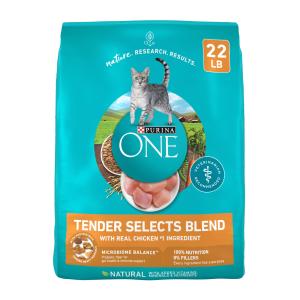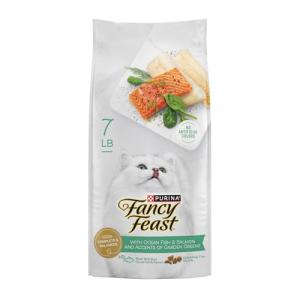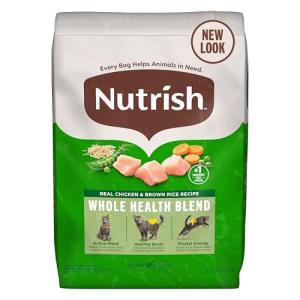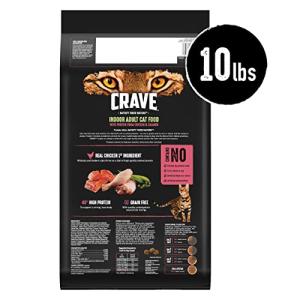If your cat struggles with digestive issues, flaky skin, or bouts of mysterious vomiting, finding the right food can feel like a never-ending search. Hill’s Science Diet Sensitive Stomach & Skin is one of the most frequently recommended formulas for cats with delicate digestion and irritation-prone skin—but does it actually live up to the hype? Many pet owners swear by it, claiming it transformed their cat’s coat, reduced vomiting, and improved stool quality in just a few weeks. But with so many sensitive-stomach formulas on the market, it’s worth digging deeper to see whether this food is genuinely superior or simply well-marketed.
In this comprehensive review, we break down everything you need to know—from ingredients and performance to real-world pros and cons—so you can decide if this product is the right fit for your feline companion.
Quick Verdict
Overall, Hill’s Science Diet Sensitive Stomach & Skin is one of the most reliable and effective dry food options for cats aged 1–6 who suffer from digestive issues or skin sensitivity. Its high digestibility, quality protein source (chicken), and blend of prebiotics and vitamin E make it particularly strong for improving stool consistency and reducing vomiting. Many cats also show noticeable improvements in coat softness and skin hydration after a few weeks of consistent feeding.
However, it may not be ideal for cats with severe food allergies (especially poultry allergies), and the price point is higher than average. Still, for pet parents seeking a vet-trusted, research-backed option that delivers real-world results, this formula stands out as one of the top choices in the sensitive-stomach category.
Features
1. Chicken & Rice Primary Formula
This cat food uses chicken as the main protein, providing a lean, easily digestible source of nutrition. Paired with rice—a gentle carbohydrate—this formula aims to support digestion without overwhelming a sensitive stomach. The simplicity of the ingredient list is one of its biggest appeals.
2. Prebiotic Fiber for Digestive Balance
One standout feature is its use of prebiotic fiber. This promotes the growth of beneficial gut bacteria, helping regulate digestion, improve stool quality, and reduce common issues like bloating or gas.
3. Skin-Nourishing Nutrients
To support skin health, the formula contains vitamin E, omega-6 fatty acids, and antioxidants. These nutrients work together to reduce dryness, promote hydration, and encourage a glossy coat.
4. No Artificial Colors, Flavors, or Preservatives
Hill’s avoids unnecessary additives that can often irritate sensitive cats. The absence of artificial ingredients makes this formula a cleaner, safer choice for pets prone to reactions.
5. Backed by Veterinary Nutritionists
Hill’s Science Diet is well known for grounding its formulas in clinical nutrition. This product is developed with input from vets and researchers, giving it an evidence-based foundation unlike many generic cat food brands.

6. Made in the USA with Global Ingredients
The food is produced in the USA under strict quality standards, which provides additional reassurance regarding safety and consistency.
These features combine to create a formula specifically engineered to ease digestive discomfort and support healthier skin and fur—two issues that often intersect in cats with sensitivities.
Performance
When evaluating sensitive-stomach pet foods, performance ultimately comes down to how well the formula delivers improvements in digestion, skin health, and overall well-being. Hill’s Science Diet Sensitive Stomach & Skin performs well across all three categories.
Digestive Improvements
One of the most immediate benefits many cat owners report is a reduction in vomiting. Cats prone to regurgitation—especially shortly after eating—often respond well to this formula’s high digestibility. The prebiotic fiber helps stabilize digestion, while the chicken-and-rice base keeps the ingredient list simple enough for delicate systems.
Stools generally become firmer, more consistent, and less aromatic. For cats with chronic loose stools or frequent litter-box discomfort, this can be a significant quality-of-life improvement. Because the food is gentle on the stomach, even cats that are known “picky eaters” often tolerate it well.
Skin & Coat Results
Performance isn’t only about digestion—skin and coat improvements are equally significant. Many cats show improved skin hydration within 3 to 6 weeks of consistent feeding. The omega-6 fatty acids and vitamin E work together to reduce flakiness and support a shinier, silkier coat.
Cats with mild seasonal allergies may experience less itchiness, and some owners report a reduction in over-grooming, hotspots, or fur thinning.
Energy & Overall Health
Because cats absorb more nutrients when digestion improves, it’s no surprise that many pet owners observe increased energy, playfulness, and general well-being. A sensitive stomach can sap vitality, so once the underlying digestive irritation is addressed, cats often appear more lively and engaged.
Transition & Palatability
While most cats adjust easily, some picky eaters may take a few days to warm up to the food due to its mild, sensitive-stomach-friendly flavor profile. Hill’s recommends transitioning over 7–10 days to avoid stomach upset.
In terms of palatability, feedback is generally positive, though not universally so. Some cats prefer stronger-smelling, more flavorful foods, but those same foods often lead to digestion issues—so the milder flavor may actually be beneficial.
Long-Term Use
This formula is safe for daily feeding and is specifically designed for adult cats aged 1–6. Cats with ongoing stomach issues often use this as their permanent diet with good long-term results. The ingredient list is balanced and complete, meaning you don’t need to supplement with additional skin or stomach-support products.
Limitations
The most significant limitation is the reliance on chicken as the primary protein source. Cats with true chicken allergies—which are more common than many owners realize—will not be able to use this formula. Additionally, since it’s not grain-free, owners searching strictly for grain-free diets may need to look elsewhere.
Overall, Hill’s Science Diet Sensitive Stomach & Skin performs consistently well in its intended areas, with noticeable improvements in digestive regularity, coat condition, and overall health for most cats who try it.
Pros & Cons
Pros
-
Excellent for reducing vomiting and improving stool quality
-
Supports softer, shinier, and healthier coats
-
Gentle, easily digestible chicken & rice formula
-
Contains prebiotic fiber and key skin-support nutrients
-
No artificial flavors, colors, or preservatives
-
Vet-recommended and backed by research
-
Often tolerated well by picky eaters
Cons
-
Not suitable for cats with chicken allergies
-
Higher price point than many mid-tier cat foods
-
Mild flavor may not appeal to all cats
-
Not grain-free, which may deter grain-averse owners
Comparison
When evaluating Hill’s Science Diet against other sensitive-stomach formulas, a few competitors usually come to mind: Purina Pro Plan Sensitive Skin & Stomach, Blue Buffalo Sensitive Stomach, and Royal Canin Digest Sensitive.
Purina Pro Plan Sensitive Skin & Stomach
Purina Pro Plan offers similar benefits in digestion and coat support, but its ingredient list tends to be longer and includes more additives. Some owners prefer Hill’s for its simpler formulation and stronger emphasis on clinical nutrition. However, Purina often wins on palatability—cats find it more flavorful.
Blue Buffalo Sensitive Stomach
Blue Buffalo is popular for its grain-free options, making it appealing for owners looking to eliminate grains. However, grain-free foods are not inherently better for cats unless a vet specifically recommends them. Hill’s tends to outperform Blue Buffalo in reducing vomiting and improving stool consistency, thanks to its highly digestible formula.
Royal Canin Digest Sensitive (Dry or Wet)
Royal Canin is another premium, vet-backed brand. Its Digest Sensitive formulas are excellent for digestion, but they often come with an even higher price tag. Compared with Royal Canin, Hill’s is more accessible while still delivering strong clinical performance.
Overall Comparison
Hill’s stands out for its balance of vet-designed nutrition, digestibility, and skin-supporting ingredients. It may not be the most flavorful or the cheapest, but when it comes to improving stomach and skin health simultaneously, it offers one of the most consistent performance profiles in the category.
Buying Guide
Choosing the right sensitive-stomach cat food involves more than just reading the label. Here are the key factors to consider when deciding if Hill’s Science Diet Sensitive Stomach & Skin is the right match for your cat.
1. Identify the Cause of Sensitivity
Not all digestive problems stem from the same issue. Your cat may have:
-
A mild food intolerance
-
A chicken allergy
-
Stress-related digestive issues
-
A sensitive GI tract by nature
If your cat has a known poultry allergy, look for a non-chicken formula instead.
2. Check Key Nutrients
A good sensitive-stomach food should include:
-
Easily digestible proteins
-
Prebiotic fiber
-
Omega fatty acids
-
Vitamins C & E for immune support
Hill’s meets all these criteria, which is why it’s often vet-recommended.
3. Avoid Common Irritants
Artificial colors, preservatives, and fillers can trigger digestive or skin reactions. Hill’s avoids these, making it a cleaner choice than many budget brands.
4. Consider Your Cat’s Age
This formula is specifically for adult cats ages 1–6. Senior cats or kittens will need different formulas tailored to their nutritional needs.
5. Transition Carefully
Any new food—even a gentle one—can cause stomach upset if introduced too quickly. Transition gradually over 7–10 days.
6. Evaluate Cost vs. Benefit
Hill’s is on the higher end price-wise, but if it reduces vet visits, improves your cat’s comfort, and prevents chronic vomiting, it may save money (and stress) long term.
Final Verdict (100–150 words)
Hill’s Science Diet Sensitive Stomach & Skin, Adult 1–6, Dry Cat Food is an excellent choice for cats who suffer from digestive issues or skin sensitivities. Its gentle, well-researched formula makes it one of the most reliable options on the market for improving stool quality, reducing vomiting, and enhancing coat health. While the higher price and chicken-based ingredients may not suit every cat, most owners notice noticeable improvements within a few weeks.
If your cat frequently deals with stomach upset or dull, irritated skin, this food is definitely worth trying—and in many cases, it becomes the long-term diet that keeps both cats and owners happier and healthier.






